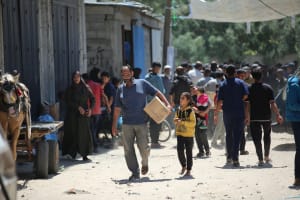Iran reportedly rejects US, Arab calls for restraint against Israel

The Islamic Republic of Iran has rejected U.S. and Arab diplomatic efforts to restrain Tehran’s expected attack on Israel, according to a report from The Wall Street Journal on Sunday.
The foreign ministers of Jordan and Lebanon traveled to the Iranian capital reportedly to defuse the tensions between Iran and Israel that affect much of the region, however the regime reportedly told the Arab diplomats that “it didn’t care if the response triggered a war.”
Iran and its Lebanese terror proxy Hezbollah have vowed “revenge” for the recent Israeli elimination of Hezbollah’s top military commander Fuad Shukr in Beirut, as well as the assassination of Hamas political chief Ismail Haniyeh in Tehran, which they allege was carried out by Israeli forces. Israel has only taken responsibility for the strike on Shukr but has neither confirmed nor denied responsibility for Haniyeh's death.
Iran feels particularly humiliated by the Haniyeh assassination, which took place when a bomb was detonated in a presumably safe VIP guest house in northern Tehran just hours after the Hamas leader attended the inauguration of the newly-appointed Iranian President Masoud Pezeshkian.
The Gaza War began on Oct. 7, when Iranian-backed Hamas terrorists invaded southern Israel and massacred 1,200 Israeli men, women and children. The following day, Hezbollah forces began shelling northern Israel from Lebanon. The Iranian-backed terror group launched a rocket attack that killed 12 Druze children while they were playing soccer in the northern town of Majdal Shams in the Golan Heights.
Washington has urged Tehran to reconsider its plans to attack Israel and emphasized that Pezeshkian's efforts to improve ties with the West will depend on showing restraint toward Israel.
Jordan, geographically located between Iran and Israel, fears that its airspace will be violated in the event of an aerial fire exchange between the Iranian and Israel forces.
"Anyone who wants to violate our skies, we will face that," Jordanian Foreign Minister Ayman Safadi stated during his visit to the Iranian capital. "Jordan will not be a battlefield," he added.
In April, Israel and an American-led international alliance neutralized 99% of the more than 300 aerial missiles, rockets and drones that Iran fired toward Israel.
Given the wide consensus among Western and Arab diplomats to prevent a full-scale regional war, it is highly likely this international alliance will be reactivated. Israeli Prime Minister Benjamin Netanyahu has warned the Iranian-led alliance of a strong Israeli response to any aggression against Israel.
The United States and Israel both believe that an Iranian-led multifront attack on Israel is imminent and could potentially begin as early as Monday.
Following a conference call on Sunday, the G7 countries jointly expressed concerns about the growing tensions in the Middle East. The G7 group is an organization of seven of the world's largest advanced economies: Canada, France, Germany, Italy, Japan, the United Kingdom and the United States.
“We express our deep concern over the heightened level of tension in the Middle East which threatens to ignite a broader conflict in the region,” read the G7 statement.
“We urge all involved parties to refrain from perpetuating the current destructive cycle of retaliatory violence, to lower tensions and engage constructively towards de-escalation. No country or nation stands to gain from further escalation in the Middle East,” the nations urged.
Since its inception in 1979, the Iranian regime has openly called for the destruction of the Jewish state and invested heavily in a proxy-terror war against Israel.
Israel is currently reportedly considering a pre-emptive strike against Iran and its terrorist proxies.

The All Israel News Staff is a team of journalists in Israel.
You might also like to read this:














